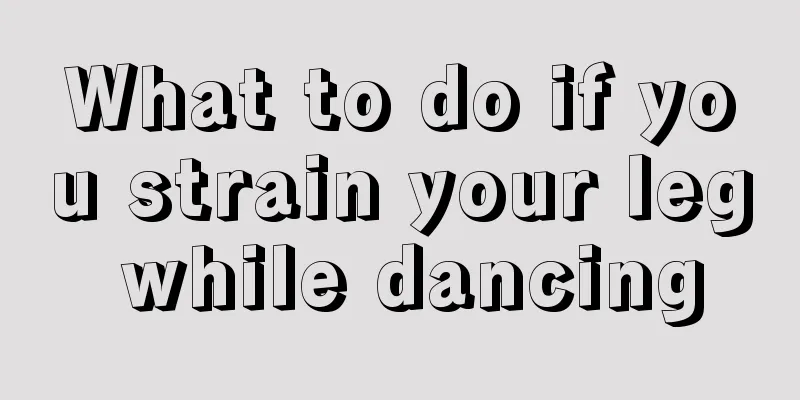What to do if you strain your leg while dancing

|
Dancing is an activity that requires a large range of motion, so dancers generally need to have very good ligaments, otherwise they are likely to suffer ligament sprains. Often before learning to dance, people first practice some basic skills, which are designed to make the ligaments more resilient. Accidents are unavoidable in dancing. What should you do if you have a leg strain during dancing? 1. What should I do if I strain my leg while dancing? 1.1. When ligament and muscle strains first occur, the injured part will show symptoms of redness, swelling and congestion. At this time, you should stop exercising immediately and try not to let the injured leg bear weight to avoid worsening of the injury. 1.2. Use ice packs for cold compresses to relieve pain and swelling. Apply cold compresses for about 15 minutes each time, 3 times a day. 1.3. You can use a breathable bandage to bandage the injured area, which can relieve the symptoms of congestion. The tightness of the bandage should be moderate. At the same time, elevate the affected area to avoid congestion. Do not run or jump within one week after the injury. You can do smaller stretching exercises. 1.4. After the injury is effectively controlled, it is recommended to go to a traditional Chinese medicine clinic or hospital for examination and treatment. Massage, acupuncture, and ointments are very effective. 2. What are the benefits of dancing? 2.1. It can enhance heart function and make the heart beat slowly and powerfully. 2.2. It can enhance the elasticity of blood vessels and reduce the possibility of blood vessel rupture. 2.3. It can enhance muscle strength, strengthen legs, feet, tendons and bones, make joints flexible, and promote blood circulation and metabolism. 2.4. It can enhance the secretory function of the digestive glands, promote regular gastrointestinal motility, increase appetite, and has a good effect on preventing and treating hypertension, diabetes, obesity, habitual constipation and other diseases. 3. Things to note when dancing 3.1. Pay attention to your heart rate: control your heart rate at 60%-75% of your maximum heart rate (220-your age). If you are 40 years old and your maximum heart rate is 180 beats/minute, multiply it by 60% or 75% to get a heart rate of 108-135 beats/minute to ensure your health. 3.2. People with high blood pressure or heart disease must control the rhythm of swaying to the music to prevent accidents. 3.3. Warm up well and don’t do too strenuous movements when dancing for the first time to avoid straining your muscles. 3.4. Don’t forget to drink enough water during exercise. Common dance injuries and care methods 1. Ankle sprain Ankle sprain is the most common acute injury in dance. A first-degree ankle sprain refers to micro-cracks or overstretching of the ligaments, while a second-degree crack is more serious and is accompanied by a crisp sound, and some people may become unstable. Grade 3 means the ligaments are completely stretched and the patient is obviously unstable. 2. Knee injury Deep squats and explosive squats in dance choreography often cause damage to the cartilage in the knee. At first, it is difficult to distinguish whether the injury is minor, moderate, or severe, especially for dancers, who will not easily give in to pain. So, unless the knee joint is locked to the point where surgery is necessary, most people treat a knee injury the same way they would treat an ankle sprain: RICE and recovery exercises, including massage therapy and active training. 3. Muscle strain A muscle strain causes the muscle to be tender and possibly swollen. A muscle strain is caused by the sudden tightening and lack of elasticity of a muscle. Dancers' backs are particularly susceptible to strain. In such cases, it is recommended that the dancer wait until physical development stabilizes. For injured hamstrings, recovery is through rest plus a gradual stretching and stretching program, rather than stretching this muscle a lot to try to jump yourself back to your original state. |
<<: What does a ligament sprain feel like
>>: How to recover quickly from abdominal strain
Recommend
What is the best medicine for mental breakdown
Patients with schizophrenia often have mental abn...
Carrot water cures baby's diarrhea
When babies have diarrhea, it is a headache for m...
Can malignant hamartoma be cured if it is discovered early?
When hamartoma grows, it compresses surrounding o...
Eight causes of chest and back pain
From a clinical point of view, most chest and bac...
What are the effects of kyanite
Since ancient times, people have had a special fa...
The fastest solution to hand cramps
Hands are one of the most frequently used parts o...
Differential diagnosis of endometrial cancer
The differential diagnosis of endometrial cancer ...
Can Guillain-Barré disease be cured? How to treat it
Don’t think that a complicated disease cannot be ...
What are epithelial cells
There are many cells in the human body, and diffe...
Does yellow croaker have many bones?
Yellow croaker is a relatively common type of fis...
Diagnostic methods for early cervical cancer
If cervical cancer is discovered early, it will b...
What is the best instrument to learn for beginners
In life, many people like music and can play one ...
The harm of long-term mental stress
In today's society, people have to face press...
What are the symptoms of mucositis?
The oral mucosa is a simple skin tissue, and comp...
How can fat be discharged from the body
As people's living standards continue to impr...









